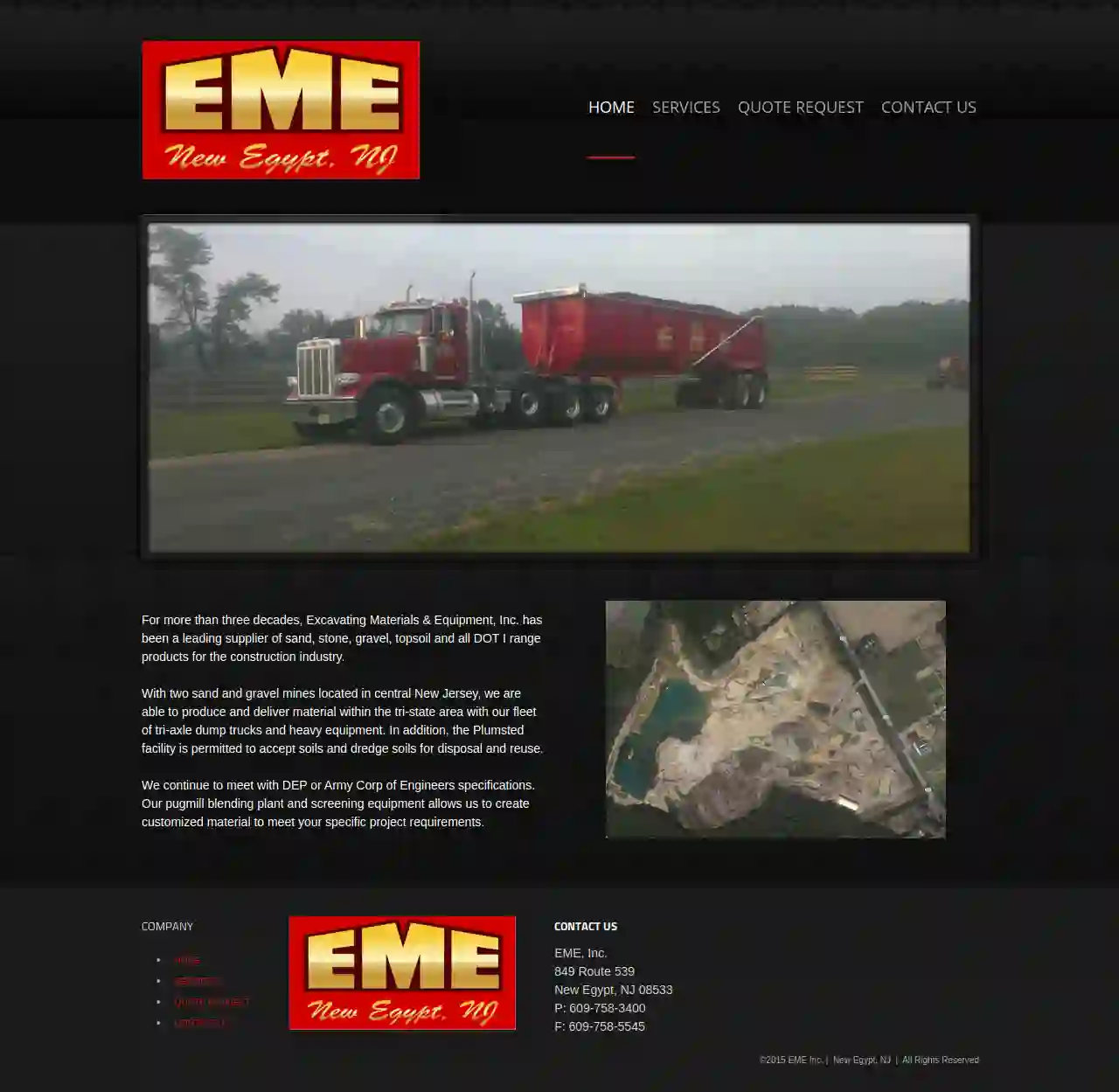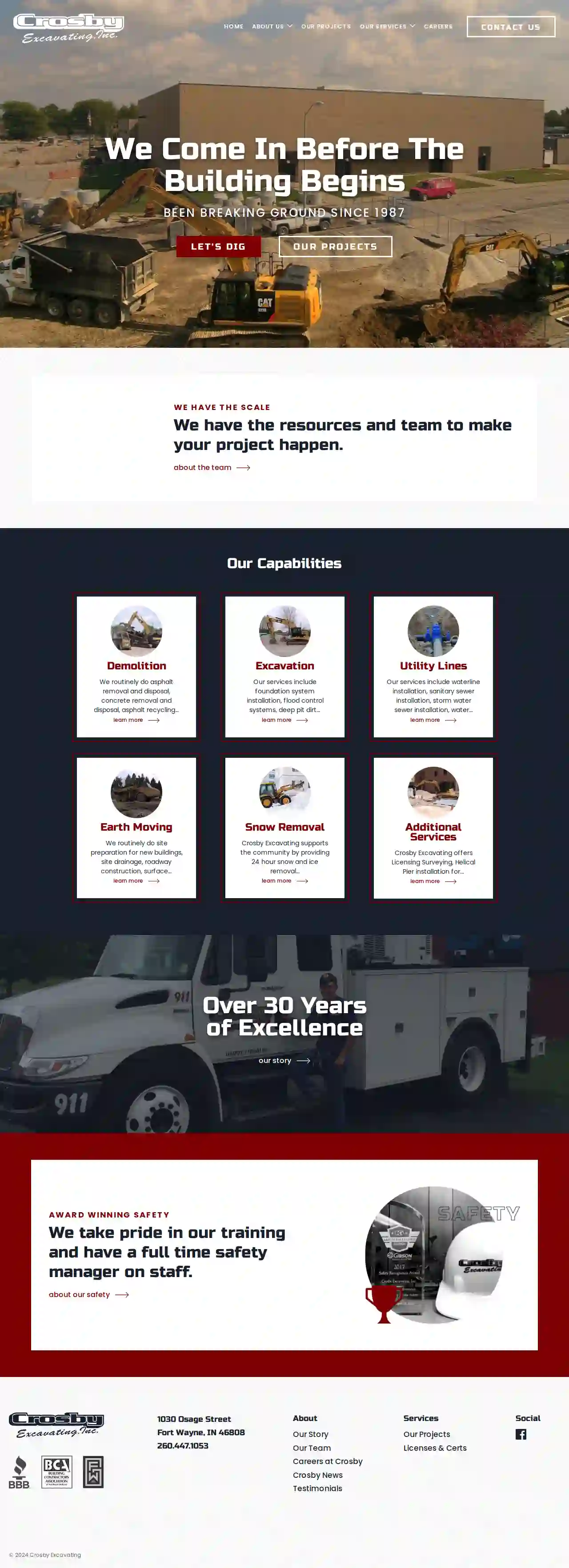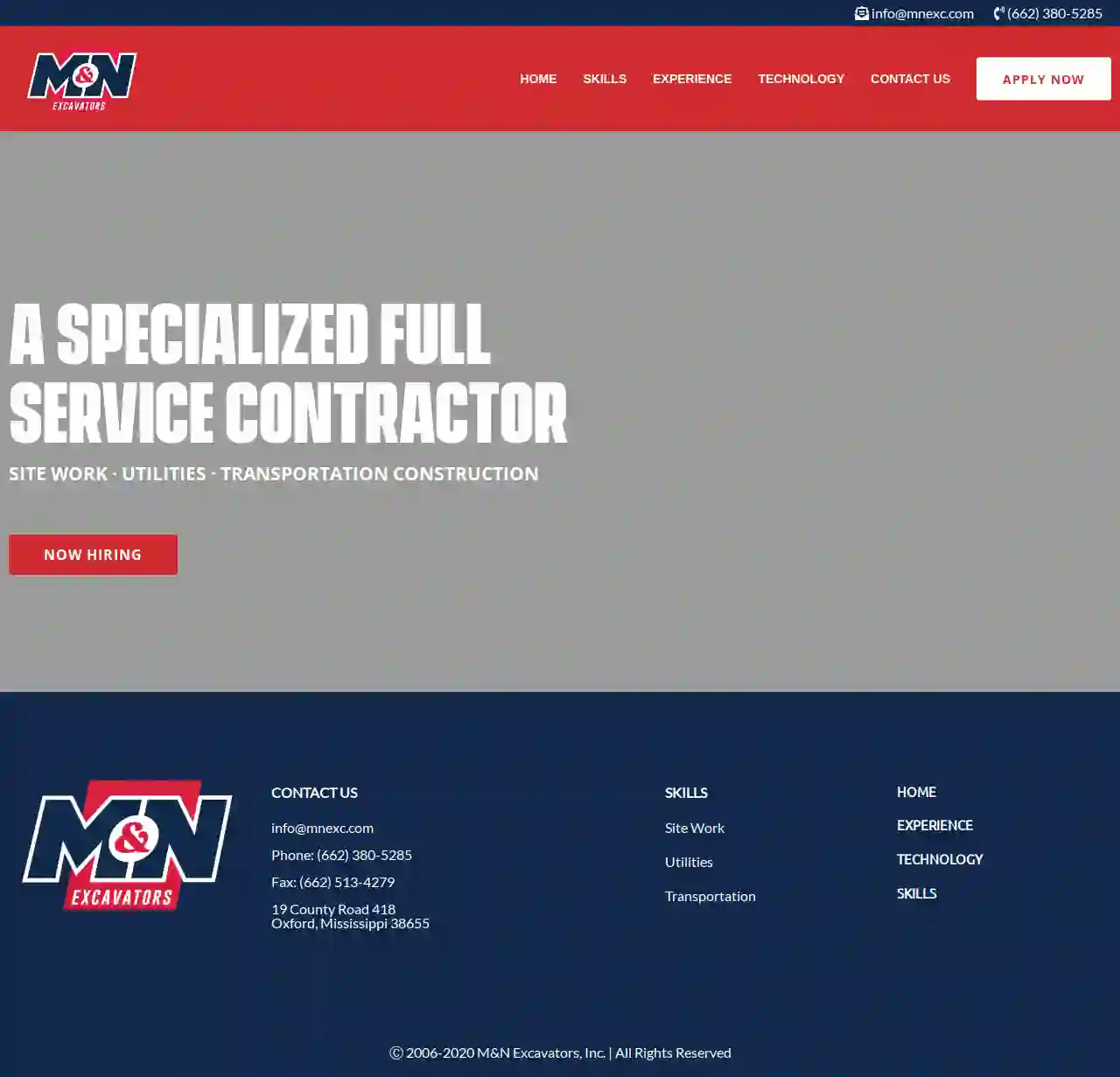Excavation Contractors Buena
Find top Excavation Services in Buena
Get 3 FREE Trenching Services quotes for your project today! Compare profiles, reviews, accreditations, portfolio, etc... and choose the best service.

W.G. Yates & Sons Construction Company
4.624 reviews104 Gully Avenue, Philadelphia, MS 39350, 39350, USYates Construction: Building the Future Yates Construction is a leading general contractor specializing in the construction of complex, large-scale projects across the United States. With a rich history spanning decades, we have established a reputation for delivering exceptional results, exceeding client expectations, and fostering lasting relationships. Our Mission Our mission is to provide our clients with the highest quality construction services, delivered on time and within budget. We are committed to safety, integrity, passion, and commitment in everything we do. Our Experience Yates Construction has a proven track record of success in a wide range of market sectors, including: E-Commerce Distribution Facilities Hospitality Gaming Technology Centers Industrial Healthcare Education Government Commercial Our Team Our team of experienced professionals is dedicated to providing our clients with the highest level of service. We are committed to building strong relationships with our clients and subcontractors, and we believe that collaboration is key to success.
- Services
- Why Us?
- Gallery
Get Quote
Excavating Materials & Equipment, Inc.
37 reviews849 Route 539, New Egypt, 08533, USExcavating Materials & Equipment, Inc. (EME) For over three decades, EME has been a leading supplier of sand, stone, gravel, topsoil, and DOT I range products for the construction industry in central New Jersey. We operate two sand and gravel mines, ensuring we can efficiently produce and deliver materials within the tri-state area using our fleet of tri-axle dump trucks and heavy equipment. Our commitment to quality extends beyond material supply. The Plumsted facility is permitted to accept soils and dredge soils for disposal and reuse, adhering to strict DEP and Army Corp of Engineers specifications. Our pugmill blending plant and screening equipment allow us to create customized materials tailored to your specific project requirements.
- Services
- Why Us?
- Gallery
Get Quote
In Earth Excavating & Contracting, Inc
4.36 reviewsWoodbridge, USIn Earth Excavating & Contracting, Inc. In Earth Excavating & Contracting, Inc. is a woman-owned business that is insured, licensed, and certified by the NJDEP. We are also OSHA trained and Roth-certified installers. We specialize in tank installations and tank removal services, as well as tank locating and much more! We offer start-to-finish solutions for every project and also many other services. We also work in collaboration with Frey Engineering for Septic Systems, Geotechnical and Environmental Services. Check out samples of our recent work on our Facebook page, and you'll agree that we're the best choice. Quality Excavation and Contracting Guaranteed: +1.908.246.6891
- Services
- Why Us?
- Our Team
- Testimonials
- Gallery
Get Quote
Bencardino Excavating Inc
54 reviews1423 Wells Drive, Bensalem, 19020, USGet the job done right with Bencardino Excavating! See How Bencardino Excavating Projects Are Setting The Standard... A long track record of successful projects, larger footprint excavating and sitework capabilities, competitive pricing, a commitment to working safely, and quality workmanship. When you hire Bencardino Excavating with our ability to handle all aspects of your sitework, and possessing decades of experience, you will keep your project on schedule and eliminate delays and change orders that are common when hiring multiple contractors for your project. An Excavating And Sitework Contractor You Can Count On... Bencardino Excavating has over thirty years of experience providing diversified, highly dependable excavating and sitework contracting for our clients in Philadelphia, and the Delaware Valley. As an excavating and sitework contractor, our capabilities allow us to handle all aspects of your project, large or small in a safe, professional, and organized way. Bencardino Excavating has a fleet of heavy-construction equipment, a team of over 140 professionals and the experience to see through any sitework project from start to finish. Our team will bring your project in on time and within budget. Bencardino’s capabilities include: demolition, clearing, excavation, grading, underground utility installation for fire, storm, water and sewer, concrete, paving and emergency services.
- Services
- Why Us?
- Gallery
Get Quote
Will Jackson's Grading
31 reviews1358 New Mexico 313, Algodones, 87001, USWill Jackson's Grading: Your Trusted Partner for Excavation and Grading in Central New Mexico When you're ready to build on a piece of property or need help preparing land that already has a structure on it, contact Will Jackson's Grading. Whether you need an excavating contractor to assist you with trenching or a grading contractor to smooth things over, you'll always get outstanding services with us. Proper land preparation requires backhoes, loaders and dump trucks to complete the process within your timeline. Contact us when you need: Grading services to prepare your land for construction Trenching services to prepare for utility and plumbing installation Demolition, including complete and partial structure removal Site preparation, including erosion control services We're a locally-owned and operated family-run business with decades of experience. We pride ourselves on consistent communication, professional and reliable contracting services, and serving the central New Mexico area.
- Services
- Why Us?
- Gallery
Get Quote
Crosby Excavating Inc
3.515 reviews1030 Osage St, Fort Wayne, 46808, USYesterday and Today One man, one truck and a vision. In 1987, our founder, Steve Crosby, had a vision, and a passion. Steve had been raised in a “construction family”. Steve’s father worked for a local construction company, and encouraged Steve to tag along with him as he went to construction sites throughout the region. It was only natural that Steve would enter the construction industry when he began his own career. Thirty-five years later, he is still here. Steve loved trucking, and moving dirt. He started Crosby Excavating very humbly, with a single dump truck. Against all odds, and through sheer determination and dedication, Steve’s little company began to take shape. One truck led to two, then his first employee, and the die was cast. Crosby’s fleet of trucks grew, as did the type and size of equipment. Today Crosby Excavating operates from its renovated facility at 1030 Osage Street, near downtown Fort Wayne. The four acre site also includes a fully staffed maintenance shop and covered equipment storage area. As a result of its focus on quality, on time performance, and cost effective pricing, Crosby Excavating is enjoying steady growth in all of its market segments. This growth has allowed Crosby Excavating to attract the best talent in the region, making Team Crosby the envy of the industry. In order to keep up with the demand for its services, Crosby Excavating has been acquiring new and more efficient capital equipment. Whether it’s pavement demolition, earth moving, excavation, or snow removal, Crosby has the right piece of equipment to do the job. No job is too large or too complex for Crosby Excavating. In 2013 Crosby Excavating grew 93 percent when compared to 2012. Growth continues at an impressive rate, in all areas of its business. This growth is the result of Crosby’s core principles: Safety first Do it right the first time Do it on time Provide unsurpassed value to our clients Crosby Excavating has been providing total site development services since 1987. It has never failed to complete a contract, and stands ready to perform for you. Our Mission We strive to maintain the highest degree of technology in the industry, so that we can offer our customers the best solutions to their needs. All Crosby Excavating employees are dedicated to the understanding that our customers are the most important people. Our customers are NOT dependent on us….we are dependent on them. Our company will continue to thrive and grow by maintaining our mission and our commitment to our customers. Award Winning Safety We take pride in our training and have a full time safety manager on staff.
- Services
- Why Us?
- Testimonials
- Gallery
Get Quote
Del Casale Excavating
511 reviews1000 County Route 106, Clifton Park, 12180, USDel Casale Excavating: Your Trusted Partner for Excavation Services Del Casale Excavating is a family-owned and operated business with over 20 years of experience in the excavation industry. We are committed to providing our clients with high-quality, reliable, and affordable services. Our team of experienced professionals is dedicated to exceeding your expectations and delivering exceptional results. We understand that every project is unique, and we take the time to listen to your needs and develop a customized plan that meets your specific requirements. Whether you need site preparation, foundation excavation, utility installation, or any other excavation service, we have the expertise and equipment to handle the job efficiently and effectively. At Del Casale Excavating, we are committed to safety and environmental responsibility. We use the latest technology and equipment to minimize our impact on the environment and ensure the safety of our workers and the public. Contact us today for a free consultation and let us help you bring your project to life.
- Services
- Why Us?
Get Quote
Four J Excavation
51 reviews2900 Broadmoor Drive, Las Cruces, 88001, USFour J Excavation: Your Trusted Partner for Dirt Work and Excavation in Las Cruces, NM Four J Excavation is a locally owned and operated dirt work and excavation company serving Las Cruces, Dona Ana County, New Mexico, and El Paso, Texas. We are a team of experienced professionals dedicated to providing high-quality excavation services for residential, commercial, and industrial projects. We are committed to delivering exceptional results, exceeding expectations, and building lasting relationships with our clients. As a retired Army Veteran, I bring a strong work ethic and commitment to excellence to every project. We understand the importance of timely completion, meticulous attention to detail, and working within budget. We are proud to serve our community and contribute to the growth and development of our region. At Four J Excavation, we are more than just an excavation company. We are your trusted partner, dedicated to helping you achieve your project goals. We take pride in our work and strive to build long-term relationships with our clients based on trust, communication, and mutual respect.
- Services
- Why Us?
- Gallery
Get Quote
M & N Excavators Inc
4.73 reviews19 County Road 418, Oxford, 38655, USM&N Excavators, Inc. is a specialized full-service contractor specializing in site work, utilities, and transportation construction. We are a team of experienced professionals dedicated to providing our clients with the highest quality services. We are committed to safety, quality, and customer satisfaction. We have a proven track record of success in the industry and are committed to providing our clients with the best possible experience. We are always looking for talented individuals to join our team. If you are interested in a career with M&N Excavators, Inc., please visit our Apply Now page.
- Services
- Why Us?
- Gallery
Get Quote
Hargrave Contractors, LLC
555 reviews122 Johnson Road, Blackwood, 08012, USAbout Us Hargrave Contractors is the leading egress window installer in NJ, DE, PA, and MD. Our mission is to enhance home safety and compliance with local building codes by offering high-quality egress window solutions. With years of experience and a dedicated team, we ensure each project meets our high standards of craftsmanship and customer satisfaction. Our Services We specialize in the installation of egress windows, which are crucial for basement safety and meet the International Residential Code requirements. Our services include: Egress Window Installation: Egress windows are essential for basement safety, providing a safe and accessible exit in case of emergencies such as fires. Our installation process includes assessing the best location, excavating the area, cutting through the foundation, installing the window, and ensuring proper drainage to prevent water issues. We use high-quality materials and follow strict installation standards to ensure your egress window is secure, functional, and compliant with all building codes. Egress Window Wells: Ensuring safety and proper drainage, our window wells provide a secure escape route in emergencies and protect your basement windows from debris and water intrusion. Custom Solutions: Every home is unique, and so are its needs. Our custom solutions cater to your specific requirements, whether it’s adapting to unique architectural features, accommodating different basement layouts, or integrating with existing home aesthetics. We work closely with you to design and implement a solution that not only meets safety standards but also enhances the overall look and functionality of your home. Why Choose Us? Expertise and Experience: Extensive experience in egress window installation. Quality Assurance: We use top-quality materials and adhere to strict installation standards. Customer Satisfaction: Our customer reviews and BBB accreditation speak to our commitment to excellence.
- Services
- Why Us?
- Gallery
Get Quote
Over 22,076+ Excavation Businesses on our platform
Our excavation companies operate in Buena and surroundings!
ExcavationHQ has curated and vetted Top Excavation Pros arround Buena. Find a trustworthy business today.
Frequently Asked Questions About Excavation Contractors
- Clear the Area: Remove any obstacles, including vehicles, outdoor furniture, landscaping features, or structures, from the excavation zone and surrounding area.
- Mark Existing Features: Identify and mark underground utilities, septic tanks, sprinkler systems, or other buried elements you want to protect.
- Protect Landscaping: Use tarps or fencing to shield trees, shrubs, gardens, or other landscaping elements from damage.
- Provide Access: Ensure the excavation contractor has clear access to the work area, including gates wide enough for equipment.
- Discuss Logistics: Coordinate with the contractor regarding parking arrangements, material delivery, and any special instructions or concerns you might have.
- Spring and Fall: Often considered favorable due to moderate temperatures and drier soil conditions.
- Summer: Can be suitable, but hot weather can make working conditions challenging and might require additional measures (shade, hydration) for workers.
- Winter: Excavation in winter can be more difficult due to frozen ground, snow, and potential delays caused by inclement weather. It might also require specialized equipment or techniques.
- Mechanical Excavation: Utilizing heavy equipment like excavators, backhoes, bulldozers, and loaders, suitable for most projects.
- Hand Excavation: Using hand tools (shovels, picks) for smaller excavations or delicate work near utilities.
- Blasting: Employing explosives to break up rock or hard materials, typically for large-scale projects.
- Hydro Excavation: Using high-pressure water jets to loosen and remove soil, often used for locating utilities or delicate excavation.
- Vacuum Excavation: Employing a vacuum system to suck up excavated material, suitable for safe excavation near utilities or in confined spaces.
How do I prepare my property for excavation?
What is the best time of year for excavation?
What are the different methods of excavation?
What is the difference between cut and fill excavation?
Cut: Involves excavating soil from an area where the existing grade is higher than the desired grade.
Fill: Refers to using the excavated soil ('cut' material) to raise the grade in an area where the existing grade is lower than desired.
This method minimizes the need to import or export soil, reducing costs and environmental impact. It's commonly used for site preparation, road construction, and landscaping.
How do I prepare my property for excavation?
- Clear the Area: Remove any obstacles, including vehicles, outdoor furniture, landscaping features, or structures, from the excavation zone and surrounding area.
- Mark Existing Features: Identify and mark underground utilities, septic tanks, sprinkler systems, or other buried elements you want to protect.
- Protect Landscaping: Use tarps or fencing to shield trees, shrubs, gardens, or other landscaping elements from damage.
- Provide Access: Ensure the excavation contractor has clear access to the work area, including gates wide enough for equipment.
- Discuss Logistics: Coordinate with the contractor regarding parking arrangements, material delivery, and any special instructions or concerns you might have.
What is the best time of year for excavation?
- Spring and Fall: Often considered favorable due to moderate temperatures and drier soil conditions.
- Summer: Can be suitable, but hot weather can make working conditions challenging and might require additional measures (shade, hydration) for workers.
- Winter: Excavation in winter can be more difficult due to frozen ground, snow, and potential delays caused by inclement weather. It might also require specialized equipment or techniques.
What are the different methods of excavation?
- Mechanical Excavation: Utilizing heavy equipment like excavators, backhoes, bulldozers, and loaders, suitable for most projects.
- Hand Excavation: Using hand tools (shovels, picks) for smaller excavations or delicate work near utilities.
- Blasting: Employing explosives to break up rock or hard materials, typically for large-scale projects.
- Hydro Excavation: Using high-pressure water jets to loosen and remove soil, often used for locating utilities or delicate excavation.
- Vacuum Excavation: Employing a vacuum system to suck up excavated material, suitable for safe excavation near utilities or in confined spaces.
What is the difference between cut and fill excavation?
Cut: Involves excavating soil from an area where the existing grade is higher than the desired grade.
Fill: Refers to using the excavated soil ('cut' material) to raise the grade in an area where the existing grade is lower than desired.
This method minimizes the need to import or export soil, reducing costs and environmental impact. It's commonly used for site preparation, road construction, and landscaping.